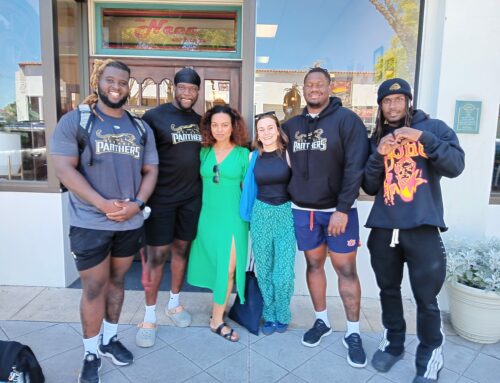Education allowed author to reclaim her life, future
Published in the Oct. 28 – Nov. 10, 2015 issue of Morgan Hill Life
By Bernice Aguilera
At first I hesitated about giving the keynote speech at Project Roadmap’s No Excuses Conference. The organizers had asked me to tell my story about my discovering my abilities during my high school years, and it was a very personal one. But my dedication and strong belief that every youth in the South County needs to have what they individually need to thrive challenged me to share.
As the young Morgan Hill students turned their attention on me at the conference held Oct. 10 at El Toro Elementary School, I started describing to them rapper Tupac Shakur’s powerful lyrics for the song “The Rose that Grew from Concrete.” Despite his popular fame for gangster rap, Lesane Parish Crooks was educated, took ballet classes and loved Shakespeare. Yes, Shakur, the author of powerful poetry and vulgar rap songs, loved Shakespeare!
I learned in my youth that each of the important women in his life was educated and had earned bachelor’s and master’s degrees. Unfortunately, youth often get mislead by what they see on television and harmful messaging on social media, whether it has to do with body imaging, concepts of beauty, drugs, appearances of success.
During middle school and some of high school I hung out with the kids who got into trouble. Believe me, there wasn’t anything fabulous about it. We were just trying to survive, be seen and heard.
The article “She Turned F’s into A’s — S.J. Teen Makes Studying Pay Off,” published in 1999 in the San Jose Mercury News, described my journey.
I ended my freshman year of high school with a 0.6 grade point average.
Through perseverance and the struggle and support of many people, I graduated with a grade point average of 3.5 and was admitted to U.C. Santa Cruz. I attended UCSC for its close proximity to home. My mother was very ill and I needed to be close to care for her. I almost took legal custody of my brother by the age of 20. My younger brother spent more nights in our dorm’s common room than I care to share.
You see, it didn’t come easy. I went from being numb to all of a sudden learning to channel that anger into loving myself and a decision to fight for my future, taking as many as eight classes my junior year while working part-time to pay for my own necessities. On three hours of sleep, I would manage to get up at 3 a.m. to complete my homework and get on three buses to go to school.
It took effort on the part of many, especially my mama, who didn’t understand English, was too timid to attend any parent meetings but still woke up at 4:30 a.m. to see me off each day.
I loved elementary school but as a first-generation college graduate, the options known to me then were limited. Many tensions at home, not seeing myself in academia, not hearing of my history in classes, or of heroes that looked like me, whom I could aspire to becoming, just made it so difficult to envision success.
I hung around with kids like me, and we did what we knew how to do and acted as we saw growing up poor.
There is an expectation for you to financially contribute to the household, hence the reason why I worked since I was a child. After graduating high school, my father expected me to work full time and the thought of attending college became so foreign that it even felt selfish.
“It’s just not for me,” I would tell all of my counselors, Mrs. Olga Morales, Mrs. Silvia Torres, Mr. Kantor, and Mrs. Parachi. But they were relentless and would ask, “Why not? Why not you?” They, like the educators present at the No Excuses Conference, were determined not to let me slip through those concrete cracks and matched me with mentors, enrolled me into support groups, peer counseling programs and even helped me complete my college applications and financial aid packets.
They even allowed me to stay in the career center daily, until late hours because it was the only safe place for me to let my guard down and just be a student allowed the luxury of studying.
I felt it was worth a shot to believe them when they said I would have access to powerful insights that I didn’t know I wanted or needed. And so, I started to dream.
Education set me free, allowing me the space to understand my difficult past circumstances and to understand my father’s struggles and that of my grandmother’s and grandfather’s before him. It wasn’t my fault. Nothing was wrong with me.
Going to college allowed me to access my culture, my own healing and the healing of my entire family; it taught me to forgive and even say “I love you.”
It allowed me to remember the power of my parent’s teachings, values are still my pillars of strength, my foundation for everything I do today. Education has allowed me reclaim my life and future, to come full circle to now support safe spaces for healthy youth.
My hope is that the youth from the No Excuses Youth Conference left knowing that they have community that believes in each of them, in their sacredness, and that the struggles they have can be overcome. They have the power to heal and to support the empowerment of their families and community. Knowledge is truly power and each child has a right to dream and live out all his or her dreams.
Love yourself enough to give yourself a chance.
Bernice Aguilera is the South County Youth Task Force coordinator. She wrote this column for Morgan Hill Life.







